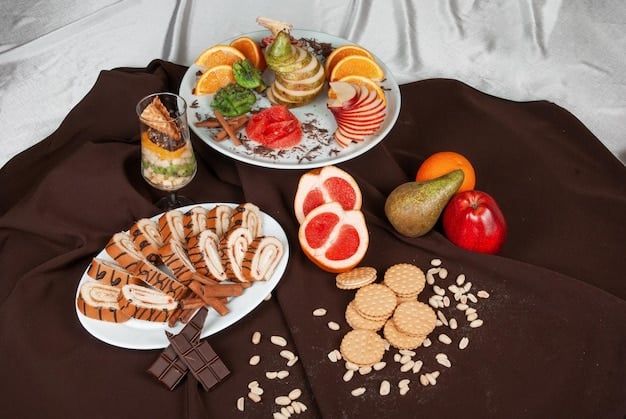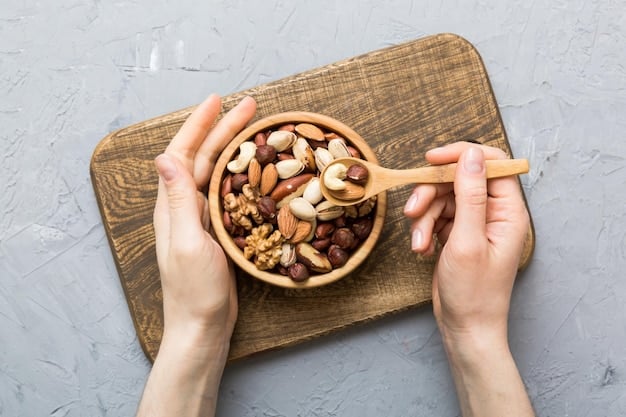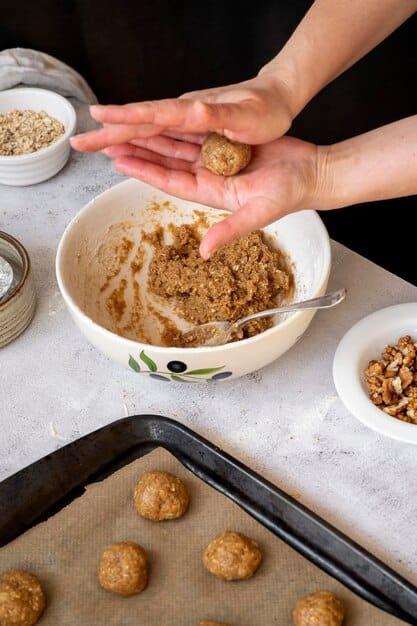The Ultimate Guide to Healthy Snacking: Fuel Your Body Right

The Ultimate Guide to Healthy Snacking: Fuel Your Body the Right Way is your comprehensive resource for mastering the art of healthy snacking, offering practical tips, delicious recipes, and expert advice to optimize your energy levels and overall well-being.
Are you ready to transform your snacking habits for the better? This The Ultimate Guide to Healthy Snacking: Fuel Your Body the Right Way will provide you insights to make smart, delicious choices that nourish your body.
Why Healthy Snacking Matters
Snacking often gets a bad rap, but it is a useful tool for managing hunger and energy levels between meals. The key is to choose snacks that provide essential nutrients rather than empty calories.
This section explores the importance of healthy snacking and how it can positively impact your overall health and well-being.
The Benefits of Smart Snacking
Planned snacking can actually prevent overeating at meals, stabilize blood sugar, and provide a much-needed energy boost. By choosing the right snacks, you can also deliver essential nutrients, vitamins, and minerals to your body throughout the day.
- Stabilized Blood Sugar: Healthy snacks can help maintain consistent blood sugar levels, preventing energy crashes and cravings.
- Nutrient Intake: Snacks offer opportunities to add more fruits, vegetables, whole grains, and protein to your daily diet.
- Energy Management: Strategic snacking can keep you feeling energized and focused, especially during long hours between meals.
Common Snacking Pitfalls to Avoid
Many people fall into the trap of choosing snacks that are high in sugar, unhealthy fats, and processed ingredients. These options offer little nutritional value and can lead to weight gain and health issues.
Avoiding these snacking errors can help you make decisions that improve your health and well-being.

Planning Your Snacks: Timing and Portion Control
When it comes to healthy snacking, timing and portion control are essential. Snacking when you’re truly hungry and keeping portions in check can help you reap the benefits without derailing your health goals.
This section explores how to effectively plan your snacks to maximize their positive impact.
Determining When to Snack
Pay attention to your body’s hunger cues. Snacking should be driven by genuine hunger, not boredom or stress. A good rule of thumb is to snack when you start feeling a dip in energy or when you know you have several hours until your next meal.
Planning your snack times helps prevent overeating and keeps your metabolism steady.
- Listen to Your Body: Only snack when you feel genuinely hungry.
- Time Your Snacks: Eat a snack 2-3 hours after a meal if you anticipate a long stretch before the next one.
- Avoid Emotional Eating: Be mindful of snacking out of boredom or stress.
Mastering Portion Control
Even healthy snacks can lead to weight gain if consumed in excessive amounts. Use small containers, pre-portion snacks, and be mindful of serving sizes to avoid overeating.
Practicing portion control keeps your calorie intake in check while still satisfying your hunger.
The Best Healthy Snack Options
Choosing the right snacks can dramatically improve your diet. Focus on whole, unprocessed foods that are packed with nutrients and low in added sugars and unhealthy fats.
This section highlights some of the best healthy snack options across various food groups.
Fruits and Vegetables
Fresh produce is an excellent choice for snacks, providing vitamins, minerals, and fiber. Opt for seasonal fruits and vegetables for the best flavor and nutritional value.
These options are naturally low in calories and high in essential nutrients.
- Apple Slices with Nut Butter: A satisfying combination of fiber and protein.
- Baby Carrots with Hummus: Crunchy and packed with vitamins and healthy fats.
- Berry Mix: Antioxidant-rich and naturally sweet.
Nuts and Seeds
Nuts and seeds are great sources of healthy fats, protein, and fiber. Choose unsalted varieties to avoid excess sodium.
Enjoy these snacks in moderation due to their high calorie content.
Dairy and Yogurt
Dairy products like Greek yogurt and cheese sticks offer a good source of protein and calcium. Opt for low-fat or non-fat options to reduce calorie intake.
These snacks can help keep you feeling full and satisfied.
DIY Healthy Snack Recipes
Creating your own healthy snacks allows you to control the ingredients and avoid unhealthy additives. Experiment with different flavors and textures to find your favorites.
This section offers some simple and delicious DIY snack recipes you can try at home.
Energy Bites
Energy bites are no-bake snacks that combine oats, nut butter, seeds, and sweeteners. They’re perfect for a quick energy boost.
Customize these bites with your favorite add-ins like chocolate chips or dried fruit.
Homemade Trail Mix
Create your own trail mix by combining nuts, seeds, dried fruit, and whole-grain cereal. This is a great way to customize your snack to your liking.
Avoid adding excessive amounts of sugary items like chocolate candies.

Snacking Strategies for Specific Needs
Different lifestyles and health conditions may require tailored snacking strategies. Understanding your individual needs can help you choose snacks that support your goals.
This section explores snacking recommendations for various scenarios.
Snacking for Weight Management
Choose snacks that are high in protein and fiber to promote satiety and prevent overeating. Opt for whole, unprocessed foods and avoid sugary or high-fat options.
Mindful snacking can support your weight management goals.
Snacking for Athletes
Athletes require snacks that provide sustained energy and aid in muscle recovery. Focus on snacks with a balance of carbohydrates and protein.
Timing your snacks around workouts can improve performance and recovery.
- Pre-Workout: A banana with peanut butter for quick energy.
- Post-Workout: Greek yogurt with berries for protein and antioxidants.
- During Long Workouts: Energy gels or chews for sustained energy.
Snacking for Diabetics
>Maintaining stable blood sugar levels is crucial for people with diabetes. Choose snacks that are low in carbohydrates and high in fiber and protein.
Consult with a healthcare professional for personalized snacking advice.
Overcoming Snacking Challenges
Even with the best intentions, sticking to a healthy snacking routine can be challenging. Common obstacles include cravings, lack of time, and accessibility to unhealthy options.
This section offers strategies for overcoming these snacking challenges.
Dealing with Cravings
Cravings can derail even the most disciplined snackers. Instead of giving in to unhealthy cravings, try to find healthier substitutions or distract yourself with other activities.
Understanding the root of your cravings can also help you manage them effectively.
Snacking on the Go
Busy schedules can make it difficult to prepare healthy snacks. Plan ahead by packing snacks in advance and keeping them readily available.
Having healthy options on hand can prevent you from resorting to unhealthy convenience foods.
| Key Point | Brief Description |
|---|---|
| 🍎 Smart Snacking Benefits | Stabilizes blood sugar and provides crucial nutrients. |
| ⏰ Timing & Portions | Snack when hungry; control portions to avoid excess calories. |
| 🥜 Best Snack Choices | Fruits, veggies, nuts and seeds for optimal health. |
| 💪 Tailored Snacking | Customize snacks for weight management, athletics, or diabetes. |
Frequently Asked Questions
▼
Some quick and healthy snack ideas include a handful of almonds, a small container of Greek yogurt, apple slices with peanut butter, baby carrots with hummus, and a hard-boiled egg. These options are convenient and nutritious.
▼
Healthy snacking can help manage weight by preventing overeating at meals, stabilizing blood sugar levels, and keeping you feeling fuller for longer. Choose snacks that are high in protein and fiber for the best results.
▼
Athletes benefit from snacks that provide a mix of carbohydrates and protein to fuel their workouts and aid in muscle recovery. Good options include a banana with nut butter, Greek yogurt with fruit, or a handful of trail mix.
▼
Yes, homemade snacks are often healthier than store-bought options because you can control the ingredients and avoid additives, preservatives, and excessive sugar. They’re also customizable to your taste and dietary needs.
▼
To snack healthily on the go, plan ahead by packing snacks in advance. Store them in convenient containers and keep them in your bag or car. This will prevent you from reaching for unhealthy convenience foods when hunger strikes.
Conclusion
Mastering the art of healthy snacking involves making informed choices, planning ahead, and listening to your body’s needs. By prioritizing whole, unprocessed foods and practicing portion control, you can boost your energy levels, manage your weight, and improve your overall health.





